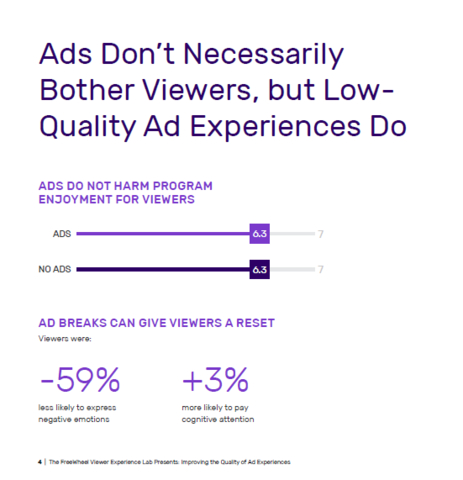New Research from FreeWheel’s Viewer Experience Lab and MediaScience Reveals that TV and Streaming Ads Do Not Harm Program Enjoyment for Viewers, But Bad Ad Experiences Do
FreeWheel and MediaScience have released a report from the Viewer Experience Lab, focusing on how ad experiences impact viewer enjoyment. The study reveals that while ads themselves do not harm program enjoyment, poor ad experiences such as latency, unnatural ad breaks, and slates negatively affect brand perception and recall. Nearly 80% of viewers are bothered by latency, and 71% are disturbed by unnatural ad breaks. The research emphasizes the need for the advertising industry to improve the viewer experience with tools to manage ad frequency and reduce blank ads. The report aims to help brands connect with audiences more effectively.
- Ads themselves do not impact program enjoyment according to the study.
- FreeWheel has developed tools to enhance the creative approval process and manage ad frequency.
- The Viewer Experience Lab initiative is committed to helping media companies improve the viewer experience through quantifiable research.
- Latency bothers nearly 80% of viewers, negatively impacting the perceived quality of programs, ads, and brands.
- 71% of viewers are bothered by unnatural ad breaks, leading to higher ad intrusiveness and decreased brand recall.
- Slates negatively impact perceived quality of surrounding ads by 3%.
- The advertising industry faces challenges with ads appearing across multiple apps and platforms without adjustments, resulting in suboptimal execution.
The third report from FreeWheel’s Viewer Experience Lab uncovers how ad latency, unnatural ad breaks, and slate disrupt the viewer experience; provides recommendations for addressing them
Research shows latency in particular remains an industry problem, bothering nearly

(Graphic: Business Wire)
“The good news for advertisers is that contrary to what some may think, research found that ads themselves don’t actually impact program enjoyment for consumers. However, what does bother them is bad ad experiences such as ad latency, unnatural ad breaks, and slate, negatively impacting brand perception and recall,” said Mark McKee, GM, FreeWheel. “It is our responsibility as an industry to work towards building better viewer experiences, which in turn will help brands connect with audiences in premium environments. We need to get this right not just for the advertisers, but for all of us as viewers.”
According to the study, there was no change in how much viewers enjoyed a program when there were ads present versus when there were no ads present. Key findings of what contributes to low-quality ad experiences include:
-
Latency: Latency bothers nearly
80% of viewers and negatively impacts the perceived quality of the program, ads, and brands. -
Unnatural Ad Breaks (or when an ad appears at a time in the content that feels disruptive):
71% of viewers are bothered by unnatural ad breaks leading to higher ad intrusiveness (+16% ) and decreased brand recall (-14% ). -
Slate: While viewers are less bothered by slates (
33% ), their physiological response to the content indicates they experience less joy compared to a program with no slates. In addition, slates negatively impact perceived quality of surrounding ads (-3% ).
In this study, viewers participated in an in-lab viewing session where they were shown 30-minute programming on a blinded streaming service with varied ad experiences including: no ads, latency, slate, and disruptive ad breaks compared to a control cell with limited ad breaks in a seamless viewing experience. To uncover the impact of low-quality ad experiences, the findings in the report are based on the viewers' responses regarding their experiences, as well as their physiological responses to the ads and content.
“With the premium video content and advertising ecosystem rapidly evolving, brands are struggling to break through the clutter and get their message in front of audiences in a meaningful way,” said Dr. Duane Varan, CEO, MediaScience. “On top of that, ads are showing up across multiple apps and platforms without any adjustments, resulting in less-than-optimal execution. This is another bespoke, industry-first research study we’ve built with the FreeWheel Viewer Experience Lab to understand the real impact that bad ad experiences have on viewers and how that ultimately impacts brands. Using the findings from this report as well as the previous two can help the industry create better ad experiences and environments for consumers.”
To address some of these industry issues, and with FreeWheel’s continued focus on the viewer experience, FreeWheel has developed tools to enhance the creative approval process, better manage ad frequency, and reduce the appearance of blank ads, or “slate.” The company plans to announce the details of this innovation in the very near future.
This is the third report from the FreeWheel Viewer Experience Lab, an initiative committed to helping media companies improve the viewer experience through quantifiable research, solutions, and technology focused on the quality, quantity, and relevance of TV advertising. This latest research was fueled by findings from a previous study from the Viewer Experience Lab that found that, based on some estimates, ad avails not filled on FAST channels can be up to
Download the full report here.
For additional information on the Viewer Experience Lab and to access previous research, visit https://www.freewheel.com/viewer-experience-lab.
About FreeWheel
FreeWheel empowers all segments of The New TV Ecosystem. We are structured to provide the full breadth of solutions the advertising industry needs to achieve their goals. We provide the technology, data enablement and convergent marketplaces required to ensure buyers and sellers can transact across all screens, across all data types, and all sales channels, in order to ensure the ultimate goal – results for marketers. With offices in
About MediaScience
MediaScience is a global pioneer in media and advertising innovation research – being the first research company to test most advertising models across most media platforms. With an extensive toolbox of in-lab and in-home solutions, as well as technology solutions developed in-house, MediaScience uses the power of experimental design to answer a myriad of research questions. Its award-winning research has been recognized globally and regularly features in top tier peer reviewed journals.
View source version on businesswire.com: https://www.businesswire.com/news/home/20240529859627/en/
Media
FreeWheel
Meredith Fitzgerald
Meredith_Fitzgerald@comcast.com
215-970-8504
Source: FreeWheel
FAQ
What did the FreeWheel and MediaScience study reveal about TV and streaming ads?
How does ad latency affect viewers according to the FreeWheel report?
What percentage of viewers are disturbed by unnatural ad breaks in the FreeWheel and MediaScience study?
What is the impact of slates on viewer experience as per FreeWheel's report?
What tools has FreeWheel developed to improve ad experiences?






